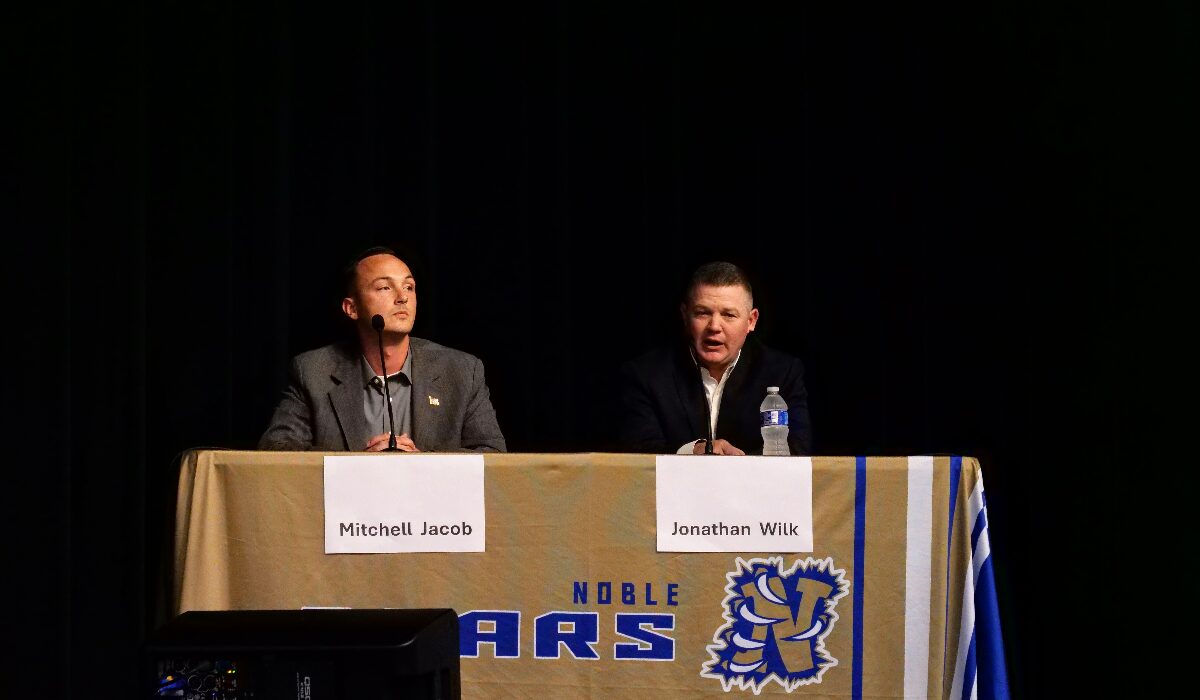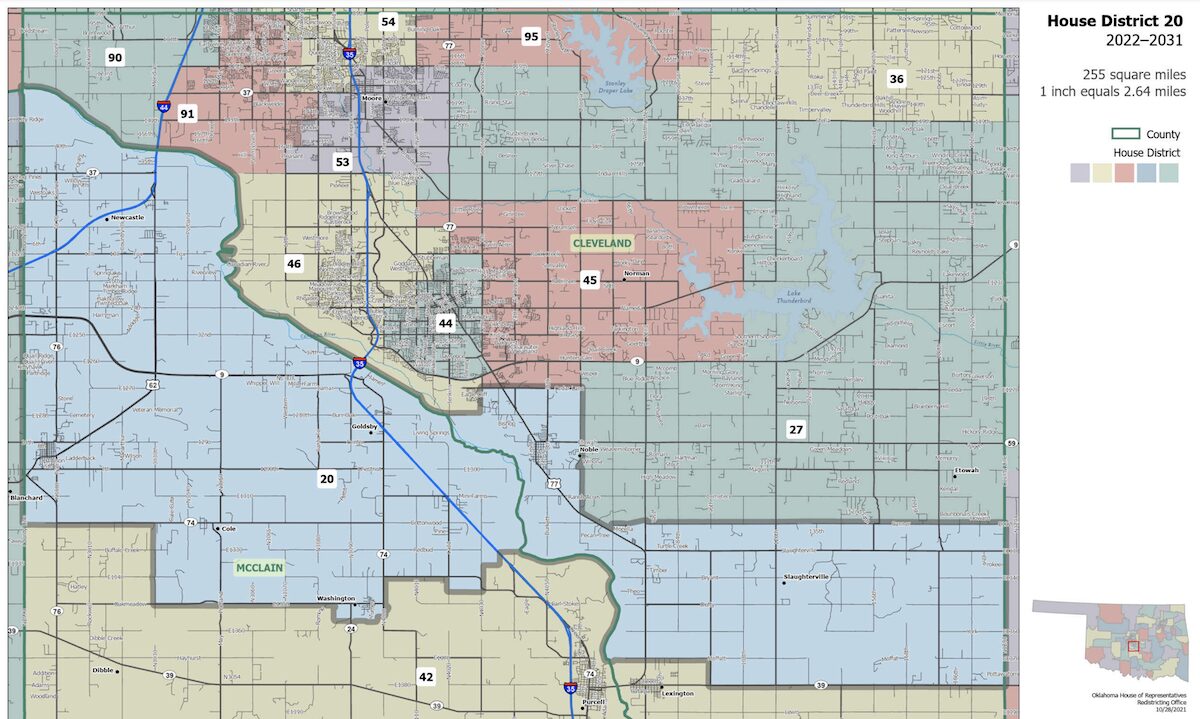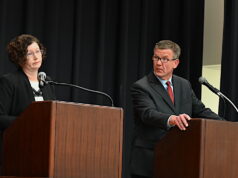
NOBLE — The race for House District 20’s open seat features a Republican fire investigator, Jonathan Wilk, who is taking some heat for controversial comments on corporal punishment shared in a recent forum with his Democratic opponent, Mitchell Jacob, an Army veteran and student at the University of Oklahoma College of Law.
Wilk shared his support for corporal punishment in response to a question about how schools should handle student discipline at an Oct. 9 forum hosted by the Noble Public Schools Foundation.
“[Teachers] need to get their hands untied, and I firmly believe in discipline. I think every teacher when I was growing up had a wooden paddle hanging at the front of the room. I’m a big proponent of that, I’m just gonna tell you,” Wilk said. “The other thing that’s really within the Legislature’s control is (to) lead by example. There’s cancers on both sides of this issue, and both groups need to work to get those cancers rooted out, to where we can all come together and come up with some solutions, and work toward the same end goal, which is educating our kids.”
Nearly a week later in a statement on Facebook, Jacob wrote that, “I DO NOT support corporal punishment in Oklahoma’s public schools.”
“I believe that discipline and parenting belong in the home,” Jacob wrote. “I vehemently oppose corporal punishment in Oklahoma’s public schools and believe that it is the role of the parent, not the government, to discipline children.”
Oklahoma state law allows local school boards to adopt their own measures in regard to corporal punishment. A bill to eliminate parent-requested exemptions allowing corporal punishment for disabled students in public schools has failed to pass in the Oklahoma Legislature for the last two years. After the Oct. 9 forum, Chrissie Ward, the secretary of the McClain County Democratic Party, confronted Wilk about the topic in an exchange toward the end of her Facebook livestream of the event.
Responding to Ward, Wilk said he supports the ability to use corporal punishment even on students with disabilities.
“If they have the ability to act like a human being, then they should be disciplined if they are not,” Wilk said.
The situation was first reported by Ben Fenwick of The Norman Transcript.
Hours after Jacob posted his Oct. 15 statement on Facebook, Wilk posted his own Facebook statement, doubling down on his position, invoking scripture and accusing Democratic leaders of using “misinformation and video manipulation.”
“The removal of discipline in the classroom is a major concern among my constituents,” he wrote. “A lack of discipline is disruptive to classrooms and society in general. All true believers follow the word of God. As Proverbs 19:18 reminds us, ‘Discipline your children while they are young enough to learn; if you don’t, you are helping them destroy themselves.'”
Jacob: ‘We should be raising wages in Oklahoma’

Wilk and Jacob are running to succeed Rep. Sherrie Conley (R-Newcastle), who chose not to seek reelection after serving three terms.
At the Oct. 9 forum, the two House District 20 candidates also discussed their opinions on wage increases, turnpikes and libraries. Wilk spoke about his wife’s experience as an emergency certified teacher when discussing long-term solutions for the state’s teacher shortage.
HD 20 spans McClain County and a southern portion of Cleveland County, representing the communities of Newcastle, Goldsby, Washington, Noble, Slaughterville and part of Blanchard.
“The emergency certifications are a good tool, but they’re not end-all, be-all. They shouldn’t be used as a substitute for permanent certifications. My wife was an emergency certified teacher prior to being certified. I understand how it’s meant to work, and how it is a benefit for the school districts and the individuals pursuing that degree field,” Wilk said. “But I think we’ve got to do a better job of supporting our school staff, and try to entice them to go ahead. ‘Hey this a commitment you can make, and we’re going to support you in that when you get into that career field.’ We can do a lot of that by toning down the rhetoric and supporting them the way they want to be supported.”
Jacob proposed a plan to offer aspiring teachers formal training, and he said he has been told the state of Oklahoma has 6,300 open teaching positions.
“That’s what I understand to be the number of teachers that we need who are fully certified to staff all the open positions — 6,300. That is a staggering number of positions we need filled,” Jacob said. “I think the long-term effects of consistently re-certifying emergency certified teachers will only be known long after the fact, and I imagine the quality of education will not be as high as it should be with fully certified teachers.”
Jacob said he would like to conduct an interim study before drafting legislation, but he hopes to create a bill that incentivizes graduates of university education programs to stay in the state.
“We have universities — like OU, Cameron, OSU — that offer teaching degrees. These are state institutions that are run by the state, so all we need is a legislator who’s willing to write a bill that says ‘X’ number of students can enroll each year for free, and then have to serve four years in a public school,” he said.
While a program similar to Jacob’s idea was already created in 2022, Jacob said he is also in favor of raising teacher salaries.
“What I believe needs to happen is that education needs to be given back to educators. The Oklahoma [statutes are] very, very clear: The Department of Education and the state Legislature does not have the authority to dictate curriculum, in-class teaching styles, things of that nature, to teachers and to educators,” Jacob said. “To be sure, we need to raise salaries — $42,000 a year with a required four-year degree, there are jobs that pay significantly better than that that do not require degrees. That’s why I applaud every educator that chooses to educate our most valuable asset, our children, despite the expectations and lack of pay that goes with that.”
Asked about salary increases for school support staff, Wilk connected the issue back to disciplinary needs, saying fewer support staff members would need to be on payroll if children behaved better.
“On support staff, what I think of when that’s mentioned is the teachers’ aides, some helpers assigned to some of the IEP students, things of that nature. By reducing the class sizes, that’ll have a big positive impact on the need to have those positions. And then the ones that you do have, we can afford to pay them more. But again, we’ve got to get to the point to where we can say, ‘Enough is enough,’ and if parents aren’t controlling their kids, they need to be sent home,” Wilk said. “I think the solution is not more government, it’s less government and more parenting. Parents need to take responsibility for their kids, and if you can’t control them at home, the school system is not there to raise your kids. By reducing the number of support staff, by having a zero-tolerance policy for those issues, I think we’re going to be able to increase that on a merit-based system.”
Jacob expressed his support for raising wages in all education professions, including school support staff.
“I believe we should be raising wages in Oklahoma, period, and that includes for support staff at schools,” Jacob said. “We will always get better applicants and better staff whenever we pay them more, offer them more benefits and take better care of them. I don’t see how you could have any negative impact, at least on the quality of education, as is the question from raising the wage of the people who are tasked with taking care of and educating our children.”
Wilk: ‘Keep the government out of your business’
Jacob encouraged constituents from any political party to contact him to discuss his representation of House District 20.
“I have conservative values built in me. I believe myself to be a conservative person, just not conservative enough for all of my friends in the district,” Jacob said. “But what that means to me is that if I’m faced with a policy that’s trying to greatly expand government or expand the role that government plays or interferes in your life, I do not support that. I believe in a government that’s accountable to the people, built by the people, and is run by the people, not a government that runs the people.”
Wilk said he agreed with Jacob’s position on representing people over a political party.
“A lot of individuals run on a conservative ticket (and say) that they want smaller government, that they want lower taxes, but then they get up there and they don’t always do that,” Wilk said. “In those situations, I’m going to go against the grain on it. I’m going to do what I said I was going to do, which is fight all I can to lower taxes, put more money in your pocket, and keep the government out of your business and out of your life.”
Asked about the Oklahoma Turnpike Authority, Wilk agreed to re-evaluate the status of controversial turnpike proposals and ensure the original agreement — which proposed removing tolls from turnpikes after their bonds were paid off — is honored.
“The original agreement has to be met, I’m not going to back down on that. Whatever we agreed to and was agreed upon by those parties needs to make sure it’s fulfilled first,” Wilk said.
Jacob took his comments a step further.
“Let’s abolish the Turnpike Authority, get rid of it, and turn them over to the Oklahoma Department of Transportation,” Jacob said. “Tell it to finish out any current revenue obligations and no additional turnpikes may be installed in the state of Oklahoma. That’s my solution, and that’s very simple to me.”
Asked about funding for libraries, Jacob talked about how much he loved the library close to his childhood home and how the many books he found there fueled his love of reading.
“I love what our libraries — at least in Newcastle that I can speak to directly — are doing. They do after-school tutoring programs for the children at the elementary and middle school, they do literary programs and toddler time, just everything that gets more people hooked on reading, the best thing to be hooked on,” Jacob said. “So what I want to do is be a friend of the library (…) and do what I can to ensure they have the support, the resources and the staff they need to keep our communities that much better, and to hopefully change another life and get another child who also wants to read for the rest of their life.”
Wilk said he supports the educational opportunities libraries provide, but he raised concerns over what else could occur at a library.
“In terms of kind of the rural library model in Oklahoma in providing internet access for youth, and even for the elderly — an opportunity for them to learn computer skills as they get up a little older in life — I support all that. What I don’t support is our libraries being used for welfare projects,” Wilk said. “From housing for homeless, from loitering, I don’t support any of that. But I do support their intent in terms of educating folks, giving folks an opportunity to learn that otherwise may not have that opportunity. But like I said, I want to be careful when we do that in what we’re actually funding.”
House District 20 map






















